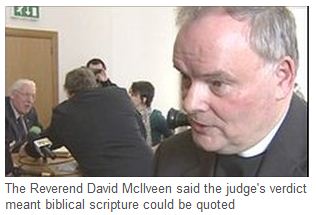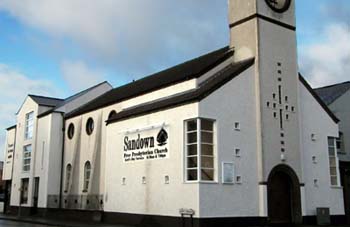Church wins court case over banned Bible ad
A Judge has ruled in favour of a Belfast church and against a decision by the Advertising Standards Authority to ban an advertisement by Sandown Free Presbyterian Church in its stand against homosexuality.
picture BBC
 A CHURCH in Northern Ireland, which had a newspaper ad banned for using the biblical word ‘sodomy’, has had the ban overturned in the High Court. The advertising regulator blocked the ad in 2008, but the court said (22/03/11) banning the ad was a breach of the church’s rights to free speech. A CHURCH in Northern Ireland, which had a newspaper ad banned for using the biblical word ‘sodomy’, has had the ban overturned in the High Court. The advertising regulator blocked the ad in 2008, but the court said (22/03/11) banning the ad was a breach of the church’s rights to free speech.
The judge, Justice Treacy, said the ad quoted well-known passages of the Bible and “constituted a genuine attempt” to stand up for the church’s beliefs.
Rev David McIlveen described the decision as a landmark ruling, meaning that scripture could be quoted freely.
 The background to the case lies in 2008 when Sandown Free Presbyterian Church placed an advert in the Belfast News Letter calling on people to meet in a “gospel witness against the act of sodomy”. The background to the case lies in 2008 when Sandown Free Presbyterian Church placed an advert in the Belfast News Letter calling on people to meet in a “gospel witness against the act of sodomy”.
The full-page advert was published ahead of a Gay Pride event in Belfast. The ASA had claimed the advert was “forceful, confrontational and threatening to a section of the community”.
But the church’s lawyers said the ad showed the “classic evangelical position between loving the sinner and hating the sin”.
At time of the ASA action against the church’s advertisement Rev. McIlveen wrote (3/12/08):
I want to initially distance myself and the Kirk Session of Sandown Free Presbyterian Church from the leak of the Advertising Standards Authority's report to the BBC.
Those who leaked the report have acted in a manner that is both unethical and disrespectful. It is peculiar to us that someone who is looking for a principled adjudication acts in a most unprincipled way.
As a Kirk Session we welcome the ASA's finding in relation to the fact that our statement did not incorporate language that was likely to incite a violent and emotional response. This we interpret as a vindication of the true spirit in which the statement was formulated. However, we believe that the part of the adjudication in which the ASA upheld the complainants’ position shows a basic and fundamental ignorance of the teaching and application of God's Word on the subject of sodomy.
By adjudicating on what is in effect the message of the bible on the code of decency is, in our opinion, the setting of a very dangerous precedent.
Many thousands of people throughout the UK are in possession of scriptures that declare sodomy as an abomination, a perversion of sexuality and a sin before God.
Therefore by determining that quotations of bible texts and their application have breached CAP Code clause 5.1 (Decency), the ASA is taking the view that the printing and publishing of certain biblical texts is INDECENT. This is an offence to every bible believer. It is ironic that an authority that seeks to prevent others from being offended appears to have no scruples in offending those who hold to the plain teaching of the word of God.
It is the belief of the Kirk Session that this part of the final adjudication by the ASA is flawed with prejudice and formed by presumption. The ASA has no evidence whatever to state "the majority of readers were likely to find the (ad) unacceptable". By taking this position we can only conclude that the ASA has forfeited their credibility to adjudication on a statement from which they received two complaints from seven complainants.
As a church we remain firm in our conviction that it is better to obey God than man; and that no counsel of man men and women can alter, dilute or remove the sincerely held views that are authorised through the message of the bible.
It has never been our intention to deliberately offend anyone, but we cannot deny that the gospel of the Lord Jesus Christ will by its very nature be a source of offence to those who rebel against its message and in turn despise its messengers. By instructing the Kirk Session to seek the advice of their own copy team "before publishing future marketing material" we see as an unwarranted interference into church affairs. It is totally unacceptable for any church to look to an outside body for their approval to print gospel tracts that are based on the word of God. This we cannot and will not do.
The adjudication is in effect censoring the church, whose ministers and members believer that the bible is the divinely inspired word of God.
We have no apology to make in declaring the word of God to be against sodomy and are confidence that this finding will serve to galvanise the witness of the Free Presbyterian Church and others, to use our democratic right of freedom of speech to protest even more determinedly against that which God hates and to campaign for those divine principles which God loves.
Current Ruling
 In delivering this most recent ruling, the judge noted that the advertisement contained no exhortation to violence and that it also made clear how violent antagonism towards homosexuals was unacceptable and unjustifiable. In delivering this most recent ruling, the judge noted that the advertisement contained no exhortation to violence and that it also made clear how violent antagonism towards homosexuals was unacceptable and unjustifiable.
He said: "The applicant's religious views and the Biblical scripture which underpins those views no doubt cause offence, even serious offence, to those of a certain sexual orientation. "Likewise, the practice of homosexuality may have a similar effect on those of a particular religious faith.
"But Article 10 (of the European Convention on Human Rights) protects expressive rights which offend, shock or disturb. "Moreover, Article 10 protects not only the content and substance of information but also the means of dissemination since any restriction on the means necessarily interferes with the right to receive and impart information."
Mr Justice Treacy emphasised that his assessment took into account the very particular context in which the advertisement was placed.
He noted: "The fact that the advertisement did not condone and was not likely to provoke violence, (it) contained no exhortation to other improper or illegal activity, (and) constituted a genuine attempt to stand up for their religious beliefs and to encourage others to similarly bear witness."
He said this had been done by citing well-known portions of scripture which underpinned the church's religious faith and its call to bear witness.
"Whilst such views and scriptural references may be strongly disdained and considered seriously offensive by some, this does not justify the full scope of the restrictions contained in the impugned determination," the judge added.
|